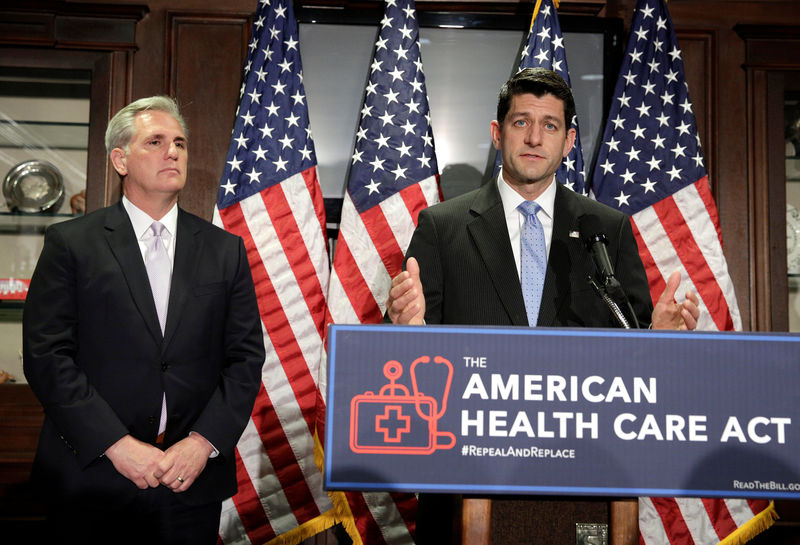By Susan Cornwell and Yasmeen Abutaleb
WASHINGTON (Reuters) - The top U.S. doctors' organization and several hospital groups came out strongly on Wednesday against a Republican plan backed by President Donald Trump to overhaul America's healthcare system, as Democrats mounted a fierce battle to thwart the bill.
Two House of Representatives committees began debating the plan and considering amendments two days after it was unveiled by Republican leaders. The legislation aims to repeal and replace the Obamacare law, which Republicans call a government overreach that has ruined healthcare in the United States.
Trump and fellow Republicans in Congress campaigned last year on a promise to dismantle the signature domestic policy achievement of Democratic former President Barack Obama.
But they face resistance from conservatives in their own party who have condemned the bill as too similar to the law it is meant to supplant. Democrats, meanwhile, have denounced it as a gift to the wealthy that will take insurance away from millions of people.
"What they’re doing is very destructive. ... It represents the biggest shift of money to the wealthiest people in our country, the top 1 percent, at the cost of working families," House Democratic leader Nancy Pelosi told reporters.
Doctors and other providers said the bill would probably cause many patients to lose insurance and raise healthcare costs. The American Medical Association doctors' group urged senior lawmakers in a letter to reconsider drastic changes to Medicaid, the government health insurance program for the poor.
The AMA, which supported Obamacare, said the replacement of income-based subsidies with age-based tax credits to help people buy insurance would make coverage more expensive, if not out of reach, for poor and sick Americans.
Obamacare, formally called the Affordable Care Act, enabled 20 million previously uninsured people to obtain coverage, about half through a Medicaid expansion the new bill would end.
Insurers are worried about the affordability of the tax structure and proposed major changes in Medicaid financing.
In a letter to Congress, America's Health Insurance Plans, which represents Anthem Inc and others, indicated that was still a concern, despite many aspects of the draft that would help stabilize the individual insurance market.
Seven hospital groups, including the American Hospital Association, America's Essential Hospitals and the Catholic Health Association of the United States, also voiced opposition, writing in a letter to lawmakers that the proposal could lead to "tremendous instability" for people seeking affordable medical coverage, including children, the elderly and disabled.
Republicans control both chambers of Congress and the White House for the first time in a decade. But the bill's fate is far from certain, with a number of Republican conservatives saying it is not a full repeal and sets up new entitlement programs.
Trump met with leaders of conservative groups on Wednesday who have concerns about the bill.
"I’m encouraged that the president indicated they are pushing to make changes," David McIntosh from one of the groups, Club for Growth, told reporters after the meeting.
"CONSERVATIVE WISH LIST"
The House Ways and Means Committee, with jurisdiction over taxes, and the House Energy and Commerce Committee, which oversees health issues, kicked off what could become marathon sessions working on the legislation.
The plan would scrap the Obamacare requirement that most Americans obtain medical insurance and would replace its income-based subsidies with a system of fixed tax credits to coax people to buy private insurance on the open market.
Trying to mollify skeptics in his party, House Speaker Paul Ryan, an architect of the plan, touted it as "a conservative wish list" and "monumental, exciting conservative reform."
Representative Mark Walker, head of the Republican Study Committee (RSC), the largest group of conservatives in Congress, said RSC leaders might support the bill if two changes are made.
The first, proposed by Representative Joe Barton in the Energy and Commerce Committee, would bring forward the end of enrollment in Medicaid expansion by two years to January 2018. The second would make age-based tax credits for purchasing health insurance partially rather than fully refundable.
With those changes, "we’d be a hard 'yes'," Walker told reporters.
Democrats were using every procedural maneuver possible to delay the committee work, including demanding votes to adjourn on the House floor. The top Energy and Commerce Committee Democrat, Representative Frank Pallone, called the Republican plan "a prescription for disaster" and said not a single hearing had been held to develop the bill.
Republicans insisted on committee action even though the nonpartisan Congressional Budget Office had not yet done its customary assessment of the cost of the measure and how many people it would cover.
White House spokesman Sean Spicer said, "If you're looking at the CBO for accuracy, you're looking in the wrong place."
Ways and Means Democrats raised questions over the bill's proposed tax break for insurance company executives, with Representative Lloyd Doggett calling it a "$400 million windfall" for insurance company executives.

Hospital stocks clawed back some of Tuesday's losses after the bill's unveiling. Community Health Systems Inc rose 4.5 percent and Tenet Healthcare Corp (NYSE:THC) gained 1.5 percent. Health insurer shares, including WellCare Health Plans Inc and Aetna Inc (NYSE:AET), closed moderately higher.